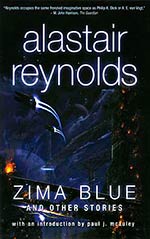
![]() Nymeria
Nymeria
7/23/2016
![]()
My successful encounter with Alastair Reynold's short fiction in Diamond Dogs, Turquoise Days persuaded me to look for more of his stories collections and this one proved to be again different from what I expected: there is a wide range of themes and moods in this anthology, and it helped me appreciate the different shades of storytelling of this amazing author.
As it happens with every collection I've read so far, not all stories were to my liking, but I can honestly say that only a couple did not manage to hold my complete attention, while the others ranged from the very interesting to the deeply engrossing. As anthologies usually go, I rate this a huge success.
Reviewing short stories is always difficult, because you don't want to give away the plot while you explore story and characterization, but this collection makes it somewhat easy because some of the stories are linked, as if they were part of a bigger background - or the seeds for more expanded storytelling - and allow the reader/reviewer more latitude.
The first and last story work as bookends for the rest of the anthology: both of them deal with journalist Carrie Clay and her search for interesting subjects as the focus of her articles. In the first one, The Real Story, she interviews the first man to set foot on Mars, that at the time in which the action takes place is both successfully colonized and a tourist attraction. Her encounter with astronaut James Grossart and his crew is both fascinating and a source of constant surprises until the very bittersweet end. The last story, the one that gives this collection its title, Zima Blue, is just as bittersweet and poignant: again we deal with a well-know person - a renowned artist this time - and are led toward incredible discoveries and a huge, intensely emotional surprise.
Hideaway, Minla's Flowers and Merlin's Gun all deal with the character of Merlin: as humanity fights what seems a losing battle against the all-destroying Husker swarms (they made me think of the Borg on steroids...), Merlin takes another path and spends long centuries alone on his ship, searching for a way to eliminate the threat. These three stories are among the best and made me think more than once that Merlin's journey deserves a novel all of its own, mostly because this is space opera in the purest Reynolds flavor and scope.
Signal to Noise and Cardiff Afterlife share again a thematic link, that of parallel worlds and the way to travel (after a fashion) between them: while the first one is a quietly emotional piece about loss and how to deal with grief when science offers you a last opportunity to say goodbye, the latter feels almost as an afterthought and did not resonate with me as the former. The concept of passage through parallel realities is however very intriguing and - to my knowledge - quite new.
Among the stand-alone stories, Beyond the Aquila Rift was one that forced me to change my point of view several times: what seems a "simple" tale of a ship's crew stranded beyond the boundaries of known space because of a navigational error, turns out to be something quite different. Enola paints a picture of a post-apocalyptic Earth and the way survivors have learned to adapt and to forge an entirely new mythology about the past and what shaped their present. Angel of Ashes imagines a religion born out of an alien visitation and geared toward integration of machine and human: I found this one interesting enough, but also quite weird.
And last but not least, Understanding Space and Time: life on Earth has been wiped out by a virus and the last surviving members of humanity dwell on Mars where a small research station had been established sometimes before the apocalypse. The scientists die one by one, either because of illness or choosing suicide out of despair, and the last survivor, Renfrew, finds the means of overcoming loneliness and sorrow through the apparition of a piano-playing musician with whom he establishes a strange kind of relationship. To say more, would be to spoil the surprises awaiting both Renfrew and the readers, but I appreciated enormously Reynolds' take on the psychology of the very last man alive, and his way of dealing with the end of civilization.
What links all of these stories is the deep sense of wonder that this author can convey with galaxy-spanning civilizations or with more enclosed backgrounds, and - more importantly - the optimistic subtext that he can infuse even in the most critical scenarios: his characters keep trying to find a way to survive, to overcome the obstacles on their path. If to do so requires them to change and adapt they do it, not without pain and loss, granted, but still they forge on, and this is a very important message, even in the face of destruction. Something we should always keep in mind...
http://spaceandsorcery.wordpress.com